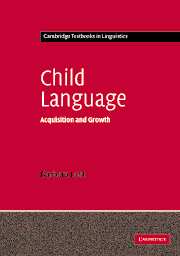
-
Select format
-
- Publisher:
- Cambridge University Press
- Publication date:
- 05 June 2012
- 21 September 2006
- ISBN:
- 9780511803413
- 9780521444781
- 9780521449229
- Dimensions:
- (247 x 174 mm)
- Weight & Pages:
- 0.97kg, 410 Pages
- Dimensions:
- (247 x 174 mm)
- Weight & Pages:
- 0.73kg, 410 Pages
You may already have access via personal or institutional login
Book description
The remarkable way in which young children acquire language has long fascinated linguists and developmental psychologists alike. Language is a skill that we have essentially mastered by the age of three, and with incredible ease and speed, despite the complexity of the task. This accessible textbook introduces the field of child language acquisition, exploring language development from birth. Setting out the key theoretical debates, it considers questions such as what characteristics of the human mind make it possible to acquire language; how far acquisition is biologically programmed and how far it is influenced by our environment; what makes second language learning (in adulthood) different from first language acquisition; and whether the specific stages in language development are universal across languages. Clear and comprehensive, it is set to become a key text for all courses in child language acquisition, within linguistics, developmental psychology and cognitive science.
Reviews
'… this glimpse into a different scientific tradition, coupled with the opportunity to grasp the complexity of this uniquely human skill made this book well worth reading…'
Source: Canadian Academy of Child and Adolescent Psychiatry
Contents
Metrics
Altmetric attention score
Full text views
Full text views help Loading metrics...
Loading metrics...
* Views captured on Cambridge Core between #date#. This data will be updated every 24 hours.
Usage data cannot currently be displayed.
Accessibility standard: Unknown
Why this information is here
This section outlines the accessibility features of this content - including support for screen readers, full keyboard navigation and high-contrast display options. This may not be relevant for you.
Accessibility Information
Accessibility compliance for the PDF of this book is currently unknown and may be updated in the future.


